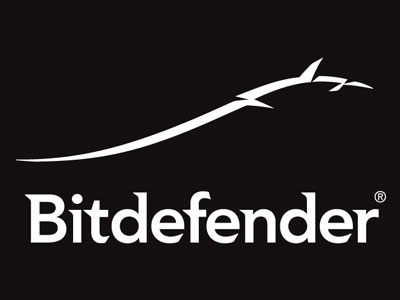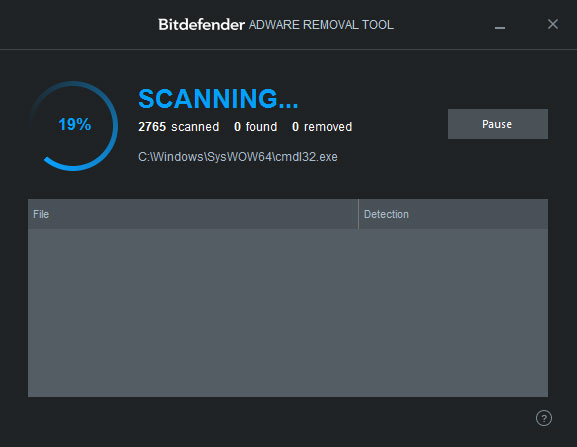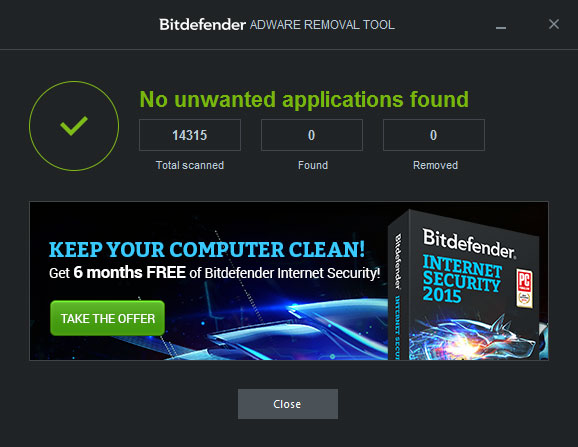Bitdefender Adware Removal Challenges Malwarebytes
Bitdefender's new free adware-removal tool is light and fast, but it surprisingly clashed with our antivirus software.


Antivirus software maker Bitdefender has released a free adware-removal tool for Windows PCs. The Bitdefender Adware Removal Tool "eliminates annoying apps, adware, toolbars and other browser add-ons," claims a company press statement, but also "provides complete protection against malicious programs that can hijack computers."
We're not sure how it does the latter, since adware-removal tools are typically much less robust than full-fledged antivirus software. The Bitdefender press statement admits as much, adding: "The tool does not replace a security solution, which should be installed and updated on all Internet-connected devices."
However, we found that the tool does interact with another company's antivirus software, albeit benignly. That's something no adware-removal tool should do.
MORE: Best PC Antivirus Software
In a quick test, we downloaded and ran the Bitdefender Adware Removal Tool, a portable application of only 44 megabytes that doesn't require installation. It features Bitdefender's clean, modern interface and quickly scanned our Windows 7 PC for adware, apparently finding nothing over the course of about 10 minutes.

Running the Bitdefender Adware Removal Tool suddenly woke up Sophos Endpoint Security and Control, our normally sleepy antivirus solution. As the Bitdefender tool scanned, the Sophos software alerted us to the presence of at least two pieces of adware or other potentially unwanted programs, moving them into quarantine and then, just as mysteriously, moving them out.
At first, we thought that Sophos might be detecting the Bitdefender tool as adware, but the latter happily continued to scan as Sophos made up its mind about what it had quarantined. (On a PC that had Bitdefender Antivirus Plus installed, the Bitdefender Adware Removal Tool wouldn't run at all, telling us that we were already protected.)
Get instant access to breaking news, the hottest reviews, great deals and helpful tips.
To compare the Bitdefender Adware Removal Tool to the adware-removal market leader, we ran Malwarebytes Anti-Malware on the first computer. Its scan took more than twice as long as Bitdefender's, but while Bitdefender found nothing, Malwarebytes found 10 pieces of adware or other potentially unwanted programs on the same computer ("none of them malicious," the software noted).
Nor did Malwarebytes Anti-Malware, which is renowned for not interfering with installed antivirus software, trigger Sophos to move things into quarantine. (The Bitdefender Adware Removal Tool did so again when we ran it a second time.) Malwarebytes did, however, suggest a system reboot to finish the adware-removal process; such a step could be viewed as more intrusive, but also as more effective.
We told Bitdefender about the unusual behavior, which the company quickly looked into.
"Our investigation shows that Sophos actually detects the files that are unpacked (i.e extracted) by Bitdefender and deletes them before we get to process them," a Bitdefender spokesman told us. "It breaks our scan process halfway. What the user sees is the files being deleted by Sophos, although they would have been detected by us."
"We recommend that you temporarily disable the antivirus solution during the test," the spokesman added. "Disconnect the PC from the Internet, and then disable the antivirus for the duration of the scan. If your antivirus is unable to detect the threats by itself, chances are that it isn't working properly anyway."
The Malwarebytes company recently released a full-fledged antivirus program, confusingly called Malwarebytes Anti-Malware Premium. That may have prompted Bitdefender, long a leader in the antivirus field, to challenge Malwarebytes on its historical turf, but Bitdefender may have left a little too much of its "real" antivirus software in its adware-removal tool.
Without a detailed evaluation, we can't tell if the Bitdefender Adware Removal Tool is better or worse than Malwarebytes Anti-Malware or, for that matter, ADWCleaner or CCleaner. But on at least one of our systems, it did clash with a true antivirus product.
- Best Mac Antivirus Software 2014
- 12 Computer-Security Mistakes You're Probably Making
- Best Free PC Antivirus Software 2014
Paul Wagenseil is a senior editor at Tom's Guide focused on security and gaming. Follow him at @snd_wagenseil. Follow Tom's Guide at @tomsguide, on Facebook and on Google+.

Paul Wagenseil is a senior editor at Tom's Guide focused on security and privacy. He has also been a dishwasher, fry cook, long-haul driver, code monkey and video editor. He's been rooting around in the information-security space for more than 15 years at FoxNews.com, SecurityNewsDaily, TechNewsDaily and Tom's Guide, has presented talks at the ShmooCon, DerbyCon and BSides Las Vegas hacker conferences, shown up in random TV news spots and even moderated a panel discussion at the CEDIA home-technology conference. You can follow his rants on Twitter at @snd_wagenseil.
-
mdd1963 For the curious, BitDef's UART does not seem to clash with 360 TS, or, Personalfirewall 7.0 under Win7.....Reply
